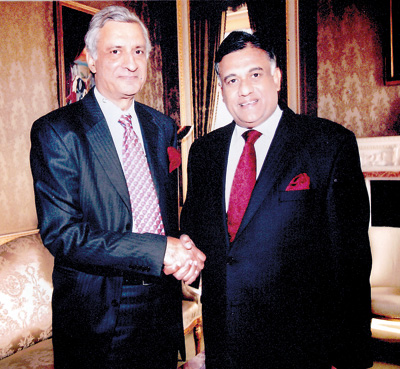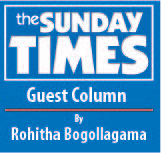News
Road to CHOGM and beyond
View(s):It was November 2007 at Kampala in Uganda where the Heads of Government of the Commonwealth met. Uganda under President Yoweri Museveni was the host for the Commonwealth Summit. Her Majesty the Queen Elizabeth and the distinguished leaders of the 54 member countries attended. At the ministerial meeting, I got the opportunity to propose Sri Lanka as the venue for the 2011 CHOGM.
 This was followed up at the 2009 CHOGM at Port of Spain in Trinidad and Tobago. We received much support from the membership. Australia under Prime Minister Kevin Rudd, with British Prime Minister Gordon Brown supporting him, proposed Australia as the venue for the 2011 CHOGM. My firm position with the blessings of President Mahinda Rajapaksa (who was not attending the CHOGM that year and was represented by Prime Minister Ratnasiri Wickramanayake) was that any shift of venue from Sri Lanka was not negotiable. But if Australia was seeking it for domestic political reasons – there was to be an election in 2011 — Sri Lanka as a gesture of goodwill would agree to the summit being held in Australia in 2011 and in Sri Lanka in 2013.
This was followed up at the 2009 CHOGM at Port of Spain in Trinidad and Tobago. We received much support from the membership. Australia under Prime Minister Kevin Rudd, with British Prime Minister Gordon Brown supporting him, proposed Australia as the venue for the 2011 CHOGM. My firm position with the blessings of President Mahinda Rajapaksa (who was not attending the CHOGM that year and was represented by Prime Minister Ratnasiri Wickramanayake) was that any shift of venue from Sri Lanka was not negotiable. But if Australia was seeking it for domestic political reasons – there was to be an election in 2011 — Sri Lanka as a gesture of goodwill would agree to the summit being held in Australia in 2011 and in Sri Lanka in 2013.
This proposal was accepted. British Prime Minister Gordon Brown proposed Australia for 2011 followed by Sri Lanka for 2013 and Mauritius for 2015. It was a unanimous decision of the CHOGM and Sri Lanka’s endorsement for 2013 could not have been changed under any circumstances since it was a decision at the Heads of Government Meeting. Hence, from November 2009 to now Sri Lanka enjoyed the Road Map laid for it with precision and overwhelming support generated at the summits in 2007 and 2009.
During the interim period, I observed there were concerns being expressed by certain countries and a possible boycott by one country. No one should have pressed any panic buttons in this connection because a member would always participate as seen in what Canada has decided to do at the Colombo summit. It is participating, though the level of representation is at deputy minister level.
The modern Commonwealth has its roots in the Imperial Conferences of the late 19th and early 20th centuries when some of the colonies within the British Empire began to acquire greater autonomy. The broad definition of Commonwealth Nations stands as “An association comprising the United Kingdom, its dependencies and many former British Colonies that are now Sovereign States with a common allegiance to the British Crown.” It was formerly established by a Statute of Westminster in 1931. The later definition of the Commonwealth of Nations is a world organisation of autonomous states that are united in allegiance to a central power but are not subordinate to it or to one another.
 As some colonies achieved self-government at varying degrees of independence from Britain, a new constitutional definition of their relationship with one another had to be found. It was only after the independence of India and Pakistan in 1947, the Commonwealth acquired its modern shape. It dropped the word British from its name, the allegiance to the Crown from its statute, and became an association for decolonised nations. The British monarch, however, remained the official Head of the Commonwealth.
As some colonies achieved self-government at varying degrees of independence from Britain, a new constitutional definition of their relationship with one another had to be found. It was only after the independence of India and Pakistan in 1947, the Commonwealth acquired its modern shape. It dropped the word British from its name, the allegiance to the Crown from its statute, and became an association for decolonised nations. The British monarch, however, remained the official Head of the Commonwealth.
The Commonwealth has no constitution or charter but the Heads of Government hold the summit every two years to discuss issues of common interest.In between the summits, its London-based Secretariat, the Commonwealth’s executive arm, takes responsibility for carrying out programmes agreed upon during the various meetings. The Secretariat is headed by a Secretary General.
The Commonwealth has been criticised for being a post-Colonial Club, but to its members it is a voluntary association of independent states to promote democracy, good governance, human rights and economic development. Another criticism of the Commonwealth is that it has little influence. Indeed Commonwealth countries do not act as a bloc in international affairs and the group has little influence over non-members. It can seek the cooperation of its members for international goals.
Unlike United Nations members, Commonwealth members have no contractual obligations, but they commit themselves to the statement of beliefs set out by Heads of Government. However, the Commonwealth draws its main strength from its moral authority. Committed to racial equality and national sovereignty, it was the focus of the campaign against apartheid in the 1980s. In 1995 it suspended Nigeria after the military regime there passed the death sentence on writer Saro-Viva and other activists, and in 2000 it suspended Fiji after the overthrow of the elected government.
What better forum can Sri Lanka have than a platform for which democracy stands as the most inter-woven thread in the fabric of Commonwealth? Sri Lanka has been a member since our independence 65 years ago. Most organisations do not have the focus in its body and the institutional framework for the upliftment and the promotion of democracy in a given country as much as the Commonwealth.
One may ask how far the Commonwealth has become effective in the fulfillment of its purposea. No doubt as I mentioned earlier it has neither the writ nor the teeth for effective implementation. It has no doctrine that is commonly implementable among member states. Hence, members who are violating any principles can only face consequences of a suspension or an expulsion, but as there is nothing tangible in terms of benefits other than the high moral values, different countries could view these as non-compulsive or unimportant. Zimbabwe’s President Robert Mugabe withdrew his country from the Commonwealth when it faced a second suspension.
Therefore, a member is expected to respect the principles to which Commonwealth is committed. Some member states in which Commonwealth principles have been embedded as cornerstones of society can become advocates of such values. One may say or one may think that the Commonwealth is all about values and values only. The simple answer to that lies with yes and yes.
When Pakistan under President Pervez Musharraf was deviating from the course of democratic elections, the Commonwealth took the decision to suspend Pakistan. Sri Lanka fought against this decision at the Ministerial Action Group (CMAG) meeting , at which I held my seat, but the majority decision prevailed. In fighting “Pakistan’s cause”, we believed that Pakistan needed more time to enter the path of democracy and it was better to engage with Pakistan than to suspend. Therefore we advocated Pakistan’s cause. The underlining principle for which Sri Lanka stood at that time was the need for greater engagement. Thereby one must not isolate the people in a member state from the wider ambit of the Commonwealth values.
It is important that we bring this aspect out more and more so that civil society can become an important element and a vehicle in the spreading of Commonwealth values. To inculcate the Commonwealth values in a given country civil society should become more conscious of these. At meetings of heads of government, having a larger international presence brings glory, festivity and deliberations. As seen in all countries, summits come and go. At the heads of government level, a three-day summit is important though the glory may fade faster than the ink on paper where the declarations are made. It is here that we get the opportunity to see the value of hosting this summit and structuring a multi-facetted programme based on the deliberations.
Sri Lanka under President Rajapaksa stands as the only country in the Commonwealth in this decade to have eliminated the threat of terrorism in toto. Few can claim such an achievement. Our neighbours are struck by the scourge of terrorism day in and day out. This is a major highlight for Sri Lanka to position itself on the way forward.
We have a good record in holding of democratic elections, not once, not twice but many times since the ending of the conflict. We held national elections, provincial elections and local council elections, which were acknowledged as being free and fair.
Some 25 years after the setting up of the provincial councils, the Northern Provincial Council has now been elected for the first time. A meaningful dialogue has been established in the polity of the country with structural constitutional reforms being addressed for devolution, including the Parliamentary Select Committee process. A development effort covering the entire landscape of Sri Lanka with high visibility on the mega development projects is under way. People-centered development is taking place for the first time in Sri Lanka covering the totality of its population. These are achievements un-parallel in Sri Lanka’s post-Independence history. These should be well presented when leaders from the Commonwealth gather here.
In the democratic world politicians fashion their values in terms of whom they represent. Therefore, respect their views. We need not agree at all times with all that is being said, but respect to for each other’s individual status should be always maintained. The CHOGM Colombo platform should not be confined to mere hospitality and pleasantries. It should be converted and converged into a horizon where goodwill can be generated. Sri Lanka should get the visiting leaders engaged extensively for Sri Lanka’s agenda — on economic and international cooperation. These should be at bi-lateral level.
The 53 Commonwealth countries represents one fourth of the world community. Once tapped, they will continue to support one another for mutual benefit. Engagement with member states should become a bi-lateral pursuit. Such opportunities should be fully exploited. What we obtain should be retained beyond the two year chairmanship of Sri Lanka and be continued for the greater benefit of the people of Sri Lanka. The hosting of CHOGM then becomes meaningful and the dividends will flow to the people. In the 21st century this will help Sri Lanka to get elevated to a higher position.
(The writer was foreign minister of Sri Lanka from January 2007 to April 2010)
comments powered by Disqus
